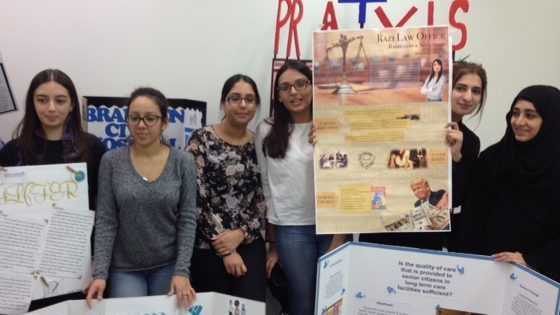Profile:
Women and Gender Studies Practicum, WGS435
Experiential learning as feminist praxis has long been a fundamental part of Women and Gender Studies programs. Initiated in 2004, WGS435Y, the UTM Women and Gender Studies Practicum, is a year-long community engaged learning course that provides the opportunity for advanced WGS students to combine theory and practice through participating in a part-time unpaid placement with a community agency, government body, educational, or social change organization.

Program Details
Instructor / Program Coordinator(s):
Professor Joan Simalchik, Program Director, Women & Gender Studies Program
Profile(s):
External Partners Faculty & Staff Students
Division:
University of Toronto Mississauga
Benefits to Students:
Students are able to engage directly in the field of their choice by applying knowledge gained in WGS courses and by working experience at the placement site. Combined with the additional skills learned in the Practicum course, students evaluate and assess their own life experience and expectations. The Practicum enables students to gain deeper insight into the operational environment by working with established learning objectives. Course evaluations reveal that WGS435 gave students genuine experience in forging campus-community linkage and collapsing the distance between education and employment.
Benefits to External Partners and the Community:
Community agencies expend much time and expertise in supporting student learning. For the relationship to be meaningful for both parties, it must be reciprocal and a true partnership. Placement sites gain student informed participation and, by determining a mutually beneficial project, material assistance. It is intended that each student placement contribute explicitly and substantially to the organization’s mandate and priorities. The University of Toronto offers access to its libraries for placement supervisors and enables ongoing support from the course professor.
Benefits to the University:
The Women and Gender Studies Program gains pedagogical expertise through ongoing analytical appraisal of the course objectives and operation. By working closely with the community, the Program is able to gauge current social and employment trends and it can then recalibrate course content to best reflect the contemporary context.
Information for Interested Students:
To learn more about WGS435, visit the Community Knowledge Alliance page.
Advice for Faculty and Staff Interested in Creating a Similar Experiential Learning Opportunity:
Internships and community engaged learning courses are distinct from traditional classroom based university courses and require a different pedagogical approach. They are time-intensive to establish and coordinate. They operate outside of the normal academic timetable because student placements are best acquired before the official start of term. They utilize pedagogical expertise that requires knowledge of critical analytic skills that can be clearly expressed for both students and placement sites. Assessment tools need to be creatively crafted because the need to capture the learning experience falls outside of typical testing methods. They require a good knowledge of the availability of placement sites and a commitment to ongoing community partnerships.
So why then engage with such courses? After fifteen years of teaching the Practicum, for me, it remains the most significant and tangible confirmation of substantial student learning. The demonstrated value of the experience is magnified past all didactic difference and, given its ultimate worth the advanced preparation seems negligible. University of Toronto provides skilled staff who have resources and expertise to assist the establishment of experiential learning courses and faculty committees afford strong peer support.
Poster Presentations, WGS435 (Photo courtesy of Professor Joan Simalchik)
Details
Partnership Based
Curricular
Unpaid
